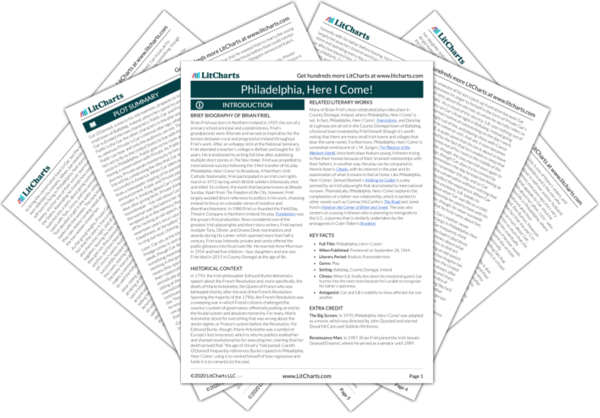Communication and Affection
In Philadelphia, Here I Come!, a play about Gareth “Gar” O’Donnell’s decision to leave his home in Ireland for the United States, Brian Friel demonstrates the difficultly of trying to convey emotions to loved ones without open communication. A young man in his mid-twenties, Gar wants to leave home largely because of his stilted relationship with his father, S.B. Although they spend the majority of their time together, they’re unable to truly connect…
read analysis of Communication and AffectionNew Beginnings and Emotional Escapism
Brian Friel uses Philadelphia, Here I Come! to examine and even challenge the idea that change inherently leads to happiness. Determined to leave the small Irish town of Ballybeg in which he has spent his entire life, Gar fixates on fulfilling the American dream by moving to Philadelphia. Planning to work at a hotel, he invests himself in the grandiose notion that relocating will bring him money and a higher social status. Moreover, his decision…
read analysis of New Beginnings and Emotional EscapismMemory, Nostalgia, and The Past
Throughout Philadelphia, Here I Come!, Brian Friel explores the way people conceive of their own memories, illustrating how they often manipulate or distort their conceptions of the past in order to trick themselves into feeling happy. Gar recognizes this tendency amongst his peers in Ireland as he prepares to travel to the United States. Unlike his friends, he appears unwilling to shine an unrealistically positive light on his past. Cognizant that neither he nor…
read analysis of Memory, Nostalgia, and The Past
Public Life, Private Life, and Identity
In Philadelphia, Here I Come!, Friel draws a stark distinction between a person’s internal and external worlds by splitting the play’s protagonist, Gar, into two separate characters: “Private” Gar and “Public” Gar, each one played by a different actor. Public Gar, the playwright explains, is the Gar who everyone else in the play sees, but Private Gar is “the unseen man, the man within, the conscience, the alter ego, the secret thoughts, the…
read analysis of Public Life, Private Life, and Identity






